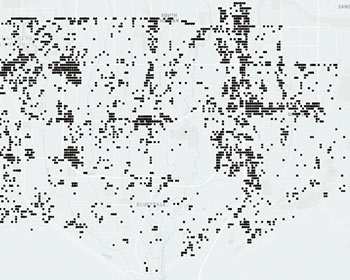

Research Reports |
| Title: | Impact of Mobility as a Service on Transit Access |
| Authors: | Xiaoyue "Cathy" Liu, Yirong Zhou, and Nima Haghighi |
| Publication Date: | Mar 2022 |
| Report #: | MPC-22-453 |
| Project #: | MPC-608 |
| TRID #: | 01845109 |
| Keywords: | COVID-19, demand responsive transportation, public transit, spatial analysis, travel behavior |
| Type: | Research Report – MPC Publications |
 The emergence of a new mode, mobility as a service (MaaS), has, to date, been most often characterized as the ride-hailing mode provided by companies such as Uber and Lyft. This study focuses on MaaS as a transit access mode. This mode is also referred to as microtransit. For this research, we describe the technical modeling steps required to account for this new transit access mode. Using Wasatch Front Travel Demand Model as a case study, this project details the steps involved so this work can be carried forward. Further, using the microtransit pilot project launched in Salt Lake City, Utah, we applied big data techniques to model the spatio-temporal pattern of microtransit activities. This work is significant as the research period has undergone the impact of COVID-19, and it represents the first of its kind to offer insights into how COVID-19 altered travel behaviors. Specifically, eigendecomposition delineated the homogeneity and heterogeneity of travel patterns across temporal dimensions. We identified first-mile/last-mile trips as a major source of variance in both pre- and post-COVID periods and that transit-dependent users prove to be inelastic despite the threat of COVID-19. The k-clique percolation method detected possible community formations and tracked how these communities evolved during the pandemic. In addition, we systematically analyzed overlapping communities and the network structure around shared nodes by using a clustering coefficient. The workflow developed in this research broadly is generalizable and valuable for understanding the unique spatio-temporal patterns of microtransit. The framework can also help transit agencies with performance evaluation, regional transport strategies, and optimal vehicle dispatching.
The emergence of a new mode, mobility as a service (MaaS), has, to date, been most often characterized as the ride-hailing mode provided by companies such as Uber and Lyft. This study focuses on MaaS as a transit access mode. This mode is also referred to as microtransit. For this research, we describe the technical modeling steps required to account for this new transit access mode. Using Wasatch Front Travel Demand Model as a case study, this project details the steps involved so this work can be carried forward. Further, using the microtransit pilot project launched in Salt Lake City, Utah, we applied big data techniques to model the spatio-temporal pattern of microtransit activities. This work is significant as the research period has undergone the impact of COVID-19, and it represents the first of its kind to offer insights into how COVID-19 altered travel behaviors. Specifically, eigendecomposition delineated the homogeneity and heterogeneity of travel patterns across temporal dimensions. We identified first-mile/last-mile trips as a major source of variance in both pre- and post-COVID periods and that transit-dependent users prove to be inelastic despite the threat of COVID-19. The k-clique percolation method detected possible community formations and tracked how these communities evolved during the pandemic. In addition, we systematically analyzed overlapping communities and the network structure around shared nodes by using a clustering coefficient. The workflow developed in this research broadly is generalizable and valuable for understanding the unique spatio-temporal patterns of microtransit. The framework can also help transit agencies with performance evaluation, regional transport strategies, and optimal vehicle dispatching.
Liu, Xiaoyue "Cathy", Yirong Zhou, and Nima Haghighi. Impact of Mobility as a Service on Transit Access, MPC-22-453. North Dakota State University - Upper Great Plains Transportation Institute, Fargo: Mountain-Plains Consortium, 2022.